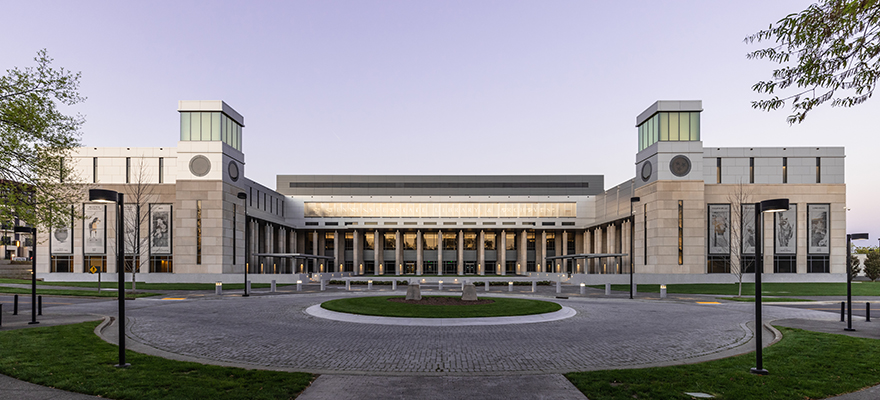It’s August, and that means back to school! As students meet new teachers, explore new subjects and rush back to see old and new friends, we pay homage to historic colleges of Tennessee, and specifically, historical women’s colleges that were once a staple in Tennessee education, but have since closed and can now only be found in the pages of history.
 |
| Anthenaeum College, Columbia, 1866. Book Stacks, 14th Annual Catalogue. Tennessee State Library and Archives |
Colleges for women typically began as female seminaries in the 18th and 19th centuries, when educational opportunities for women were limited. Beginning in 1820, women’s education grew into a growing trend to support women’s equality. According to the Women’s College Coalition, "Seminaries educated women for the only socially acceptable occupation: teaching. Only unmarried women could be teachers. Many early women's colleges began as female seminaries and were responsible for producing an important corps of educators."
 |
| Ward Seminary, Nashville, 1902, Book Stacks. Tennessee State Library and Archives |
In Nashville alone, several ladies institutions sprang up, from Boscobel College to Buford College to the Nashville College for Young Ladies. Boscobel College was in operation from 1889 to 1916. Its primary objective was to be able to provide the lowest cost for higher education to young ladies. The 10 acre campus was located in East Nashville overlooking the Cumberland River. The East Nashville fire of 1916 effected its closing.
 |
| Boscobel College, Nashville. 1910. Books Stacks, Salmagindi Yearbook. Tennessee State Library and Archives |
 |
| Boscobel College, 1910. Books Stacks, Salmagindi Yearbook. Tennessee State Library and Archives |
 |
| Boscobel College, 1910. Women’s basketball team. Books Stacks, Salmagindi Yearbook. Tennessee State Library and Archives |
Dr. Price’s Nashville College for Young Ladies sat not far from East Nashville, where the current federal building sits on Broadway in downtown Nashville. Nashville College for Young Ladies provided a well-rounded education and covered kindergarten to college age. They touted themselves as the "Leading Southern School for the Advanced Education of Women."
 |
| Dr Price’s Nashville College for Young Ladies, Nashville- 1896, Book Stacks, The Talisman. Tennessee State Library and Archives |
One of NCYL’s associates, Mary Elizabeth Burgess Buford, became a top educator in Nashville, and went on to found Buford College in Clarksville. Buford College moved to Nashville in 1901 in the neighborhood of Green Hills and Oak Hill area. According to its publications, Buford College was adorned with gardens, springs, an electric car line and even featured a hennery and dairy for healthy dietary needs. After a few more moves around the city, Buford College closed in 1920.
 |
| Buford College, Nashville, 1912- Domestic Science Class. Book Stacks, The Mirror Yearbook. Tennessee State Library and Archives |
On the south side of Nashville, right off of Nolensville Road, sits a hill that once held another educational institution for females, Radnor College. Radnor College was started by A.N. Eshman. and served from 1906 until 1914. In 1921, a fire claimed the college’s main building. The school also had its own printing plant nearby, operating for the Cumberland Presbyterian Publishing House until 1924.
 |
| Radnor College, Nashville, undated. Tennessee Postcard Collection. Tennessee State Library and Archives |
Of course, there were several other women’s colleges outside of Nashville as well. In Murfreesboro, a female academy named Soule College ran from 1851 until 1917. During the Civil War in 1862, the school closed temporarily so that it could function as a hospital by both Confederate and Union Soldiers.
 |
| Soule College, Murfreesboro- Newspaper Clipping, 1943, Vertical Files. Tennessee State Library and Archives |
Elsewhere in Tennessee, East Tennessee Female Institute operated out of Knoxville, Howard Female College educated out of Gallatin, Tennessee Female College served in Franklin, Centenary Female College in Cleveland, Mary Sharp College in Winchester, Brinkley Female College in Memphis, and Moses Fisk’s Female Academy in Hilham, among others here and there.
 |
| Howard Female College, Gallatin, 1915, Book Stacks, School Directory. Tennessee State Library and Archives |
 |
| Tennessee Female College, Franklin, 1904-School Directory. Tennessee State Library and Archives |
 |
| Tennessee Female College, Franklin, 1904-Book Stacks, School Directory. Tennessee State Library and Archives |
The education provided to these ladies by the fine educators of Tennessee helped to further women’s equality and rights and it can be arguably concluded that their resourcefulness led to the equality we experience today, especially now as we celebrate the 100th year of the passage of the 19th amendment and Tennessee’s important role in this historic milestone.
The Tennessee State Library and Archives is a division of the Office of Tennessee Secretary of State Tre Hargett

Excellent use of library and archival materials!
ReplyDeleteMy mother was astudent at Ward-Belmont College, which later went broke.
ReplyDelete